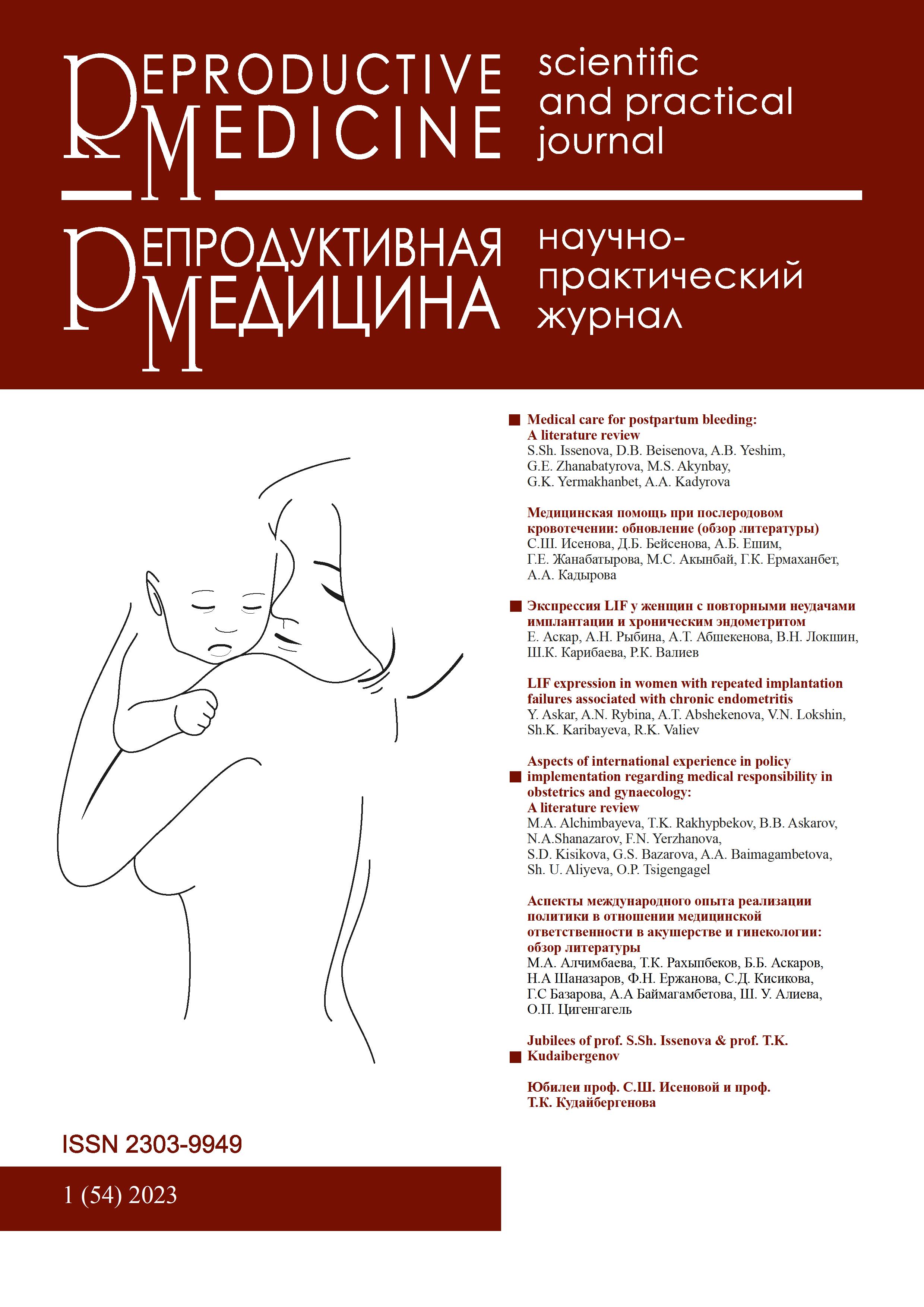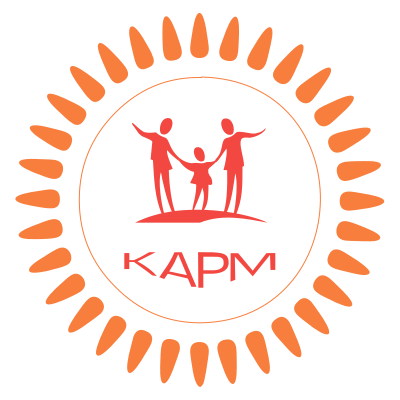Medical and social characteristics of Kazakhstan women practicing breastfeeding
DOI:
https://doi.org/10.37800/RM.1.2023.8-15Keywords:
breastfeeding, medical and social characteristicsAbstract
Relevance: Breastfeeding is one of the most effective ways to save a child’s health and has several advantages for the nursing woman. Monitoring the epidemiology of breastfeeding is an ongoing process of both practical and scientific interest.
The study aimed to investigate the medical and social characteristics of Kazakhstani women practicing breastfeeding.
Materials and methods: The study included Kazakhstani women (aged 18 to 45) practicing breastfeeding. In this cross-sectional study, the main method was a survey. Data collection was carried out in February 2023. A total of 1159 women participated in the study; 1101 questionnaires were included in the analysis. The descriptive and analytical statistical methods were applied. The absolute values were calculated, and the specific gravity was calculated with the determination of its standard error. Association was studied using Pearson’s chi-square test.
Results: About 30% of Kazakhstani «alma maters» have some degree of dissatisfaction with their own nutrition, and about half of the women have a low/medium level of satisfaction with their own rest (sleep). A rather low level of satisfaction of lactating women (more than 50%) with the opportunity to express themselves in something (a favorite pastime) and opportunities for cultural and leisure activities were revealed. A low/medium level of satisfaction with the opportunity to communicate with friends and people close to the same interests is typical for 45% of respondents. About ¼ of breastfeeding, women are not fully satisfied with family relationships, and about 40% of women are somewhat dissatisfied with social and legal protection. The degree of satisfaction of Kazakh breastfeeding women with certain conditions of a personal and social nature is associated (at the level of p≤0.05) with education, marital status, place of residence, and a history of using surgical methods during delivery.
Conclusion: The main conclusion that can be drawn from the results of the study is as follows: some medical and social characteristics of Kazakhstani women (nutrition, nature of rest (sleep), opportunities for self-realization, etc.) practicing breastfeeding can be a marker of the risk of successful breastfeeding. Incl. Significant epidemiological factors that can influence the practice of breastfeeding include the level of education, marital status, place of residence, and the history of nursing women using surgical methods during delivery.
References
ЮНИСЕФ Казахстан. Совместное заявление Исполнительного директора ЮНИСЕФ Кэтрин Рассел и Генераль-ного директора ВОЗ д-ра Тедроса Адханома Гебрейесуса по случаю Всемирной недели грудного вскармливания. Пресс-релиз от 3 августа 2022 г. [YuNISEF Kazaxstan. Sovmestnoe zayavlenie Ispolnitel’nogo direktora YuNISEF Ke’trin Rassel i General’nogo direktora VOZ d-ra Tedrosa Adxanoma Gebrejesusa po sluchayu Vsemirnoj nedeli grudnogo vskarmlivaniya. Press-reliz ot 3 avgusta 2022 g. (in Russ.)]. https://www.unicef.org/eca/ru/Пресс-релизы/совместное-заявление-исполнительного-директора-юнисеф-кэтрин-рассел-и-генерального. 09.03.2023.
ЮНИСЕФ Казахстан. В Казахстане меньше половины детей на грудном вскармливании. Пресс-релиз от 10 мая 2018 г. [YuNISEF Kazaxstan. V Kazaxstane men’she poloviny detej na grudnom vskarmlivanii. Press-reliz ot 10 maya 2018 g. (in Russ.)]. https://www.unicef.org/kazakhstan/Пресс-релизы/в-казахстане-меньше-половины-детей-на-грудном-вскармливании. 09.03.2023.
Маншук Асаутай. В числе причин отказа от кормления грудью – отсутствие поддержки // Радио Азаттык. – 04.08.2017 [Manshuk Asautaj. V chisle prichin otkaza ot kormleniya grud’yu – otsutstvie podderzhki // Radio Azattyk. – 04.08.2017 (in Russ.)]. https://rus.azattyq.org/a/grudnoe-vskarmlivanie-osadchaya/28658378.html.
Комитет по статистике МНЭ РК, ЮНИСЕФН и ЮНФПА. Итоговый отчет по результатам Кластерного обследо-вания по многим показателям, проведенного в Казахстане в 2015 г. – Астана, Казахстан, 2016 [Komitet po statistike MNE’ RK, YuNISEFN i YuNFPA. Itogovyj otchet po rezul’tatam Klasternogo obsledovaniya po mnogim pokazatelyam, provedennogo v Kazaxstane v 2015 g. – Astana, Kazaxstan, 2016 (in Russ.)]. https://bala.stat.gov.kz/files/MICS_2015_ ru.pdf.
Cohen S.S., Alexander D.D., Krebs N.F., Young B.E., Cabana M.D., Erdmann P., Hays N.P., Bezold C.P., Levin-Sparenberg E., Turini M., Saavedra J.M. Factors Associated with Breastfeeding Initiation and Continuation: A Meta-Analysis // J. Pediatr. – 2018. – Vol. 203. – Р. 190-196.e21. https://doi.org/10.1016/j.jpeds.2018.08.008.
Patnode C.D., Henninger M.L., Senger C.A., Perdue L.A., Whitlock E.P. Primary Care Interventions to Support Breastfeeding: Updated Evidence Report and Systematic Review for the US Preventive Services Task Force // JAMA. – 2016. – Vol. 316(16). – Р.1694-1705. https://doi.org/10.1001/jama.2016.8882.
Gila-Díaz A., Carrillo G.H., López de Pablo Á.L., Arribas S.M., Ramiro-Cortijo D. Association between Maternal Postpartum Depression, Stress, Optimism, and Breastfeeding Pattern in the First Six Months // Int. J. Environ. Res. Public Health. – 2020. – Vol. 17(19). – Art. ID: 7153. https://doi.org/10.3390/ijerph17197153.
Islam M.J., Broidy L., Baird K., Rahman M., Zobair K.M. Early exclusive breastfeeding cessation and postpartum depression: Assessing the mediating and moderating role of maternal stress and social support // PLoS One. – 2021. – Vol. 16(5). – Art. ID: e0251419. https://doi.org/10.1371/journal.pone.0251419.
Emerson J.A., Tol W., Caulfield L.E., Doocy S. Maternal Psychological Distress and Perceived Impact on Child Feeding Practices in South Kivu, DR Congo // Food Nutr. Bull. – 2017. – Vol. 38(3). – Р. 319-337. https://doi.org/10.1177/0379572117714385.
Chakona G. Social circumstances and cultural beliefs influence maternal nutrition, breastfeeding and child feeding practices in South Africa // Nutr. J. – 2020. – Vol. 19(1). – Р. 47. https://doi.org/10.1186/s12937-020-00566-4.
Nagel E.M., Howland M.A., Pando C., Stang J., Mason S.M., Fields D.A., Demerath E.W. Maternal Psychological Distress and Lactation and Breastfeeding Outcomes: a Narrative Review // Clin. Ther. – 2022. – Vol. 44(2). – Р. 215-227. https://doi.org/10.1016/j.clinthera.2021.11.007.
Mohd Shukri N.H., Wells J., Eaton S., Mukhtar F., Petelin A., Jenko-Pražnikar Z., Fewtrell M. Randomized controlled trial investigating the effects of a breastfeeding relaxation intervention on maternal psychological state, breast milk outcomes, and infant behavior and growth // Am. J. Clin. Nutr. – 2019. – Vol. 110(1). – Р. 121-130. https://doi.org/10.1093/ajcn/nqz033.
ВОЗ: все больше женщин рожают с помощью кесарева сечения при отсутствии медицинских показаний // Новости ООН. – 16 июня 2021 [VOZ: vse bol’she zhenshhin rozhayut s pomoshh’yu kesareva secheniya pri otsutstvii medicinskix pokazanij // Novosti OON. – 16 iyunya 2021 (in Russ.)]. https://news.un.org/ru/story/2021/06/1404792. 09.03.2023.
Downloads
Published
How to Cite
Issue
Section
License
The articles published in this Journal are licensed under the CC BY-NC-ND 4.0 (Creative Commons Attribution – Non-Commercial – No Derivatives 4.0 International) license, which provides for their non-commercial use only. Under this license, users have the right to copy and distribute the material in copyright but are not permitted to modify or use it for commercial purposes. Full details on the licensing are available at https://creativecommons.org/licenses/by-nc-nd/4.0/.





